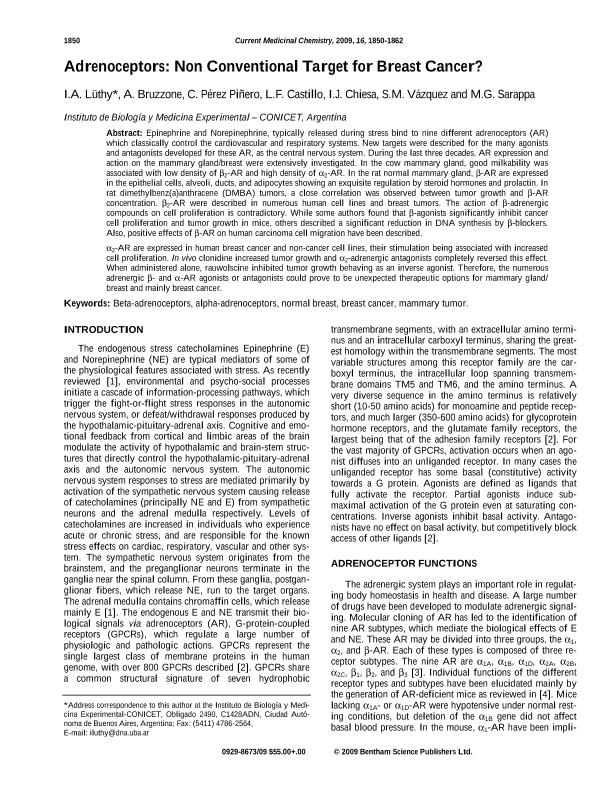Artículo
Adrenoceptors: non conventional target for breast cancer?
Luthy, Isabel Alicia ; Bruzzone, Ariana
; Bruzzone, Ariana ; Perez, Cecilia
; Perez, Cecilia ; Castillo, Lilian Fedra
; Castillo, Lilian Fedra ; Chiesa, Ignacio Javier; Vázquez, S. M.; Sarappa, Maria Gabriela
; Chiesa, Ignacio Javier; Vázquez, S. M.; Sarappa, Maria Gabriela
 ; Bruzzone, Ariana
; Bruzzone, Ariana ; Perez, Cecilia
; Perez, Cecilia ; Castillo, Lilian Fedra
; Castillo, Lilian Fedra ; Chiesa, Ignacio Javier; Vázquez, S. M.; Sarappa, Maria Gabriela
; Chiesa, Ignacio Javier; Vázquez, S. M.; Sarappa, Maria Gabriela
Fecha de publicación:
05/2009
Editorial:
Bentham Science Publishers
Revista:
Current Medicinal Chemistry
ISSN:
0929-8673
e-ISSN:
1875-533X
Idioma:
Inglés
Tipo de recurso:
Artículo publicado
Clasificación temática:
Resumen
Epinephrine and Norepinephrine, typically released during stress bind to nine different adrenoceptors (AR) which classically control the cardiovascular and respiratory systems. New targets were described for the many agonists and antagonists developed for these AR, as the central nervous system. During the last three decades, AR expression and action on the mammary gland/breast was extensively investigated. In the cow mammary gland, good milkability was associated with low density of beta2-AR and high density of alpha2-AR. In the rat normal mammary gland, beta-AR are expressed in the epithelial cells, alveoli, ducts, and adipocytes showing an exquisite regulation by steroid hormones and prolactin. In rat dimethylbenz(a)anthracene (DMBA) tumors, a close correlation was observed between tumor growth and beta-AR concentration. B2-AR were described in numerous human cell lines and breast tumors. The action of beta-adrenergic compounds on cell proliferation is contradictory. While some authors found that beta-agonists significantly inhibit cancer cell proliferation and tumor growth in mice, others described a significant reduction in DNA synthesis by beta-blockers. Also, positive effects of beta-AR on human carcinoma cell migration have been described. alpha2-AR are expressed in human breast cancer and non-cancer cell lines, their stimulation being associated with increased cell proliferation. In vivo clonidine increased tumor growth and alpha2-adrenergic antagonists completely reversed this effect. When administered alone, rauwolscine inhibited tumor growth behaving as an inverse agonist. Therefore, the numerous adrenergic beta- and alpha-AR agonists or antagonists could prove to be unexpected therapeutic options for mammary gland/ breast and mainly breast cancer.
Archivos asociados
Licencia
Identificadores
Colecciones
Articulos(IBYME)
Articulos de INST.DE BIOLOGIA Y MEDICINA EXPERIMENTAL (I)
Articulos de INST.DE BIOLOGIA Y MEDICINA EXPERIMENTAL (I)
Citación
Luthy, Isabel Alicia; Bruzzone, Ariana; Perez, Cecilia; Castillo, Lilian Fedra; Chiesa, Ignacio Javier; et al.; Adrenoceptors: non conventional target for breast cancer?; Bentham Science Publishers; Current Medicinal Chemistry; 16; 15; 5-2009; 1850-1862
Compartir
Altmétricas



